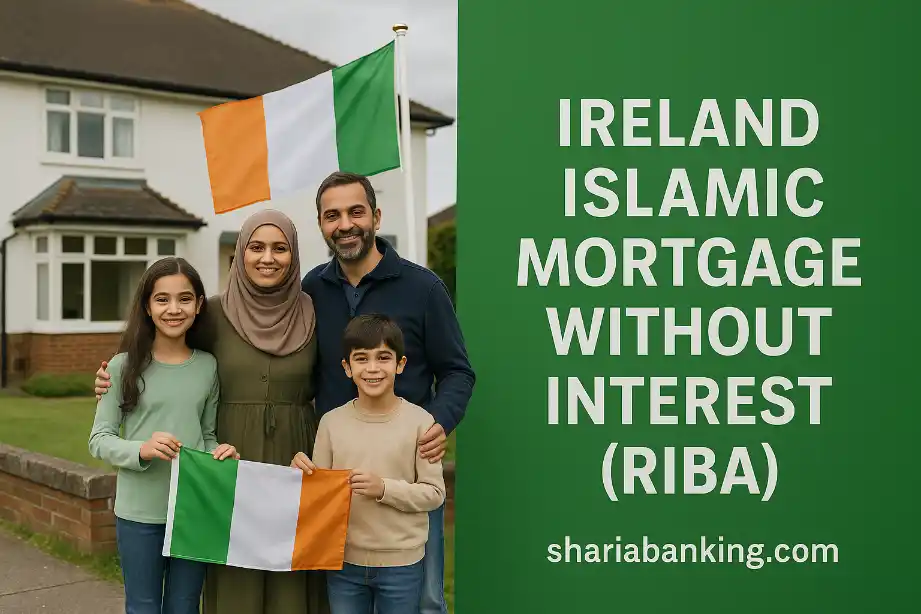
What is in Ireland a halal home loan without Riba (interest)
An Ireland Islamic mortgage without interest (riba) is a Sharia-compliant home-finance arrangement that avoids charging or paying interest.
it uses contracts such as Ijara (lease-to-own), Diminishing Musharaka (shared ownership where the customer gradually buys out the financier’s share and pays rent on the remaining share), or Murabaha (cost-plus sale with a fixed, pre-agreed profit).
Why Irish Muslims opt for Islamic mortgages with no interest: the foremost reason is religious—avoiding riba while still accessing home ownership. Beyond faith alignment, these products are typically asset-backed, aim for transparency (e.g., a known sale price in Murabaha or clear rent/ownership split in Diminishing Musharaka), and follow ethical screens.
In Ireland, Halal home loan with no interest are meanwhile accepted by the Irish financial regulator; the tax treatment aims for neutrality so Islamic arrangements are not disadvantaged versus conventional ones; the Revenue Commissioners provide a dedicated page (updated May 26, 2025) explaining how to notify “specified financial transactions” (e.g., Ijara, Murabaha) and the forms involved (SFT1/SFT2).
Can I get an Islamic mortgage without riba in Ireland ?
Yes and No—options exist, but they’re limited. Ireland recognises Sharia-compliant home-finance structures (like Ijara, Murabaha and Diminishing Musharaka) in its tax rules, which helps providers operate here.
However, the only operational Shariah-style financing in Ireland is through Community Finance Ireland (CFI), which provides Murabaha-based property financing. However, this is only for community organizations or social enterprises, with loan amounts up to €500,000—not for individuals.
WHAT DO I NEED TO BE ELIGIBLE FOR A HALAL HOME LOAN IN IRELAND ?
Inferred Eligibility Requirements Once Products Launch
Although no products are available yet, we can anticipate eligibility criteria based on models from the UK and other markets:
- Deposit / Equity Contribution
- Typically, a minimum deposit of around 20% of the property value is required.
- Proof of Income & Affordability
- Applicants must demonstrate stable income and pass affordability assessments similar to those in conventional mortgage processes.
- Shariah-compliant Financing Structure
- Financing would need to follow Islamic structures such as Murabaha, Ijara, or Diminishing Musharaka.
- Regulatory and Tax Clarity
- Ireland’s legal and tax framework has made some progress—such as defining “specified financial transactions” in the Finance Act 2010 and allowing equivalent tax treatment for Islamic products.
- But full regulatory clarity for retail Islamic mortgages is still pending.
WHICH HALAL LENDERS IN IRELAND ARE PROPOSING ISLAMIC MORTGAGES WITH NO RIBA ?
Here’s the Ireland-specific picture (as of 8 September 2025):
- Halal Mortgage Ireland (Dublin 16) – actively marketing Sharia-compliant home-finance in Ireland (positions itself as “the first provider” in Ireland). Do your own due diligence on authorisation and Sharia certification before applying. Halal Mortgage+1
- Offa (UK) – not an Irish lender, but relevant context: in Dec 2024 Offa bought Bank of Ireland’s legacy Alburaq Sharia-compliant home-finance portfolio (i.e., existing UK plans moved to Offa). That was a book sale, not a new Irish product launch.
Useful backdrop (not lenders): Ireland’s Revenue recognises Islamic-finance contracts (e.g., Ijara, Murabaha, Diminishing Musharaka) for tax purposes, which helps providers operate here, but it doesn’t mean many are live yet.
What to do next
- Ask any provider for: Central Bank of Ireland authorisation, Sharia-board certificates, and a plain-English summary of the contract (Ijara/Murabaha/Musharaka). 2) Confirm Irish tax treatment (Revenue “Islamic financing” guidance) and legal advice before you commit.